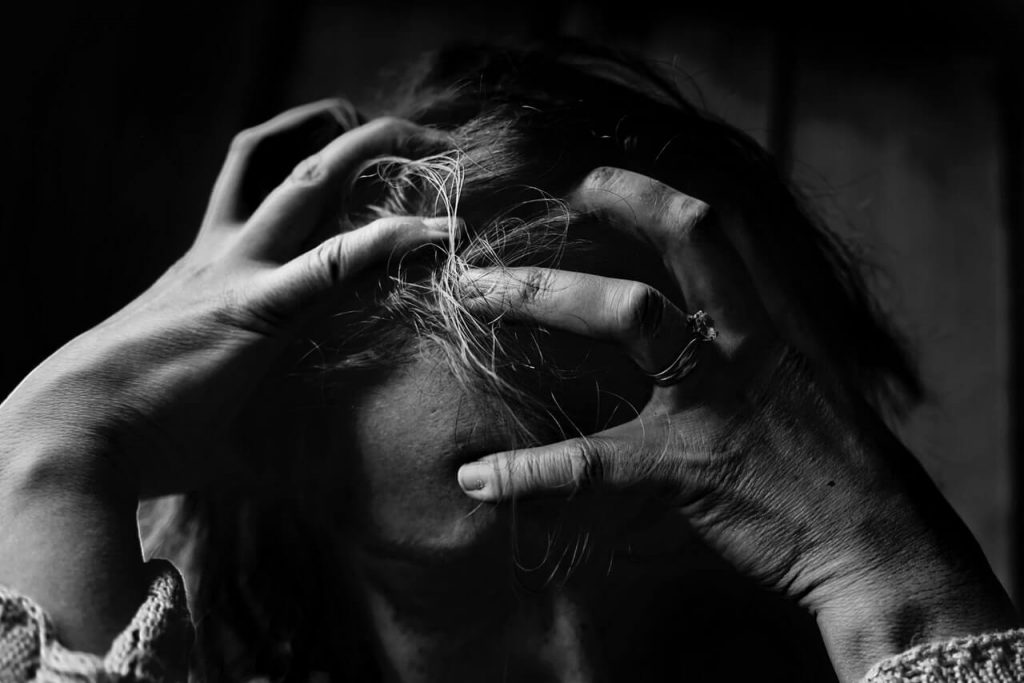
Negative thoughts and irrational beliefs are a major factor in anxiety. These are automatic patterns stemming from the past but they can be changed, bringing relief from anxiety. Photo by Kat Jayne.
Although it’s normal to feel some anxiety in certain situations – such as when starting a new job, going for an interview or a medical test, or when speaking or performing in public – for some people anxiety is a long-term condition and it can have a serious impact on their quality of life.
Anxiety can be generalised (ongoing) or triggered by specific situations, such as stress at work, family problems, financial difficulties, or traumatic events and circumstances. It can also be related to other conditions, such as social anxiety disorder, phobias, post-traumatic shock disorder or panic disorder.
Symptoms of anxiety
Some common symptoms are:
- a sense of impending doom or disaster, fear that something bad is about to happen to ourselves or a loved one
- fear, panic, unease, restlessness, stress, worry
- increased heart rate, palpitations, high blood pressure
- dizziness, feeling light-headed or faint, head spinning, ringing in the ears, dry mouth
- sweating, itching, feeling hot or flushed
- muscle pains and cramps, shaking, fidgeting, nervous twitching or repetitive movements, nail biting, teeth grinding, pacing
- stuttering, not being able to think straight or get words out properly, difficulty concentrating
- nausea, abdominal pains, headaches, loss of appetite
- insomnia or disrupted sleep.
Negative thoughts and irrational beliefs
A significant factor in anxiety is the thoughts and beliefs that we have about ourselves, other people and the world. Even though the external circumstances may indeed be difficult or challenging, it’s our negative thoughts and irrational beliefs that determine how we perceive and deal with those circumstances.
For example, we might have thoughts and beliefs like ‘I must always be perfect’, ‘I’ll be humiliated if I fail’, ‘People won’t accept me’ or ‘It’s not safe to socialise’. We might also have self-deprecating thoughts about our anxiety itself, such as ‘I shouldn’t be this anxious’, ‘I’m a useless person for having this anxiety’ or ‘I’ll never get over this anxiety’. These are ways of resisting the anxiety, which only makes it persist.
How did we get these thoughts and beliefs?
These thought patterns and beliefs stem from the past and were created unconsciously in response to things we experienced in life. They were survival strategies, ways of protecting ourselves when we encountered difficult or traumatic situations. Although they made sense at the time, they no longer serve us, yet they stay with us and operate like programs running automatically in us whenever we encounter certain situations.
What can be done about these thoughts and beliefs?
The good news is that we can uncreate these thoughts and beliefs. When we do this, external circumstances may still be challenging but we’ll no longer be compelled to think and believe in fixed ways by those programs being triggered in us. We’ll be able to face life’s challenges and deal with them in a rational, conscious and proportionate way. We can be at peace with ourselves and the world.

Clearing our negative thoughts and limiting beliefs restores inner peace. Photo by VisionPic.
A self-help technique
A useful self-help technique when feeling anxious is to notice what thoughts and beliefs are present for you in relation to the situation. Just observe them and then, compassionately and without judgement or criticism, question them. Is it really rational to think or believe those things about the situation you’re facing? Consider that your thoughts and beliefs may not be the absolute truth that always applies. They’re not necessarily written in stone. What other possible thoughts or beliefs could there be in this situation? How might someone else think if they were looking at the situation as an impartial observer? Could you shift your viewpoint and think/believe differently?
How coaching can help
The self-help technique should give you some degree of relief as it helps you to disidentify from the habitual thoughts and beliefs that arise automatically.
If you want to go deeper and resolve the self-sabotaging thought patterns and limiting beliefs that are underlying your anxiety, please get in touch to find out how I could help you with that.